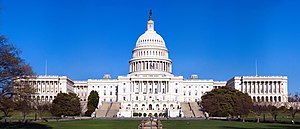As long as we have the current leadership in Congress, the federal government will continue to grow. That is true despite what you are hearing about coming drastic cuts by the super committee or drastic cuts if the super committee fails.
This is where we are:
George Will posted an article at the Washington Post yesterday explaining that the current discussions are all smoke and mirrors.
The article reports:
But suppose the sequester occurs. Ignore loose talk about “draconian” spending cuts. Veronique de Rugy of George Mason University’s Mercatus Center has a graph you should see.
It shows two lines. The top one charts spending, 2013-2021, without the sequester; the other shows spending with the sequester. Both lines are ascending. Both show annual spending rising from less than $4 trillion to more than $5 trillion. The space between them is so narrow that it is difficult to see that there are two lines. Without the sequester, spending will increase $1.7 trillion; with the sequester, spending will increase $1.6 trillion. Here are categories of spending:
Ten-year spending increases:
Without With
Defense 20 percent 18 percent
Nondefense discretionary 14 percent 12 percent
Medicare 62 percent 62 percent
Other mandatory 51 percent 51 percent
Net interest 152 percent 136 percent
This whole super committee thing seems to be much ado about nothing.




